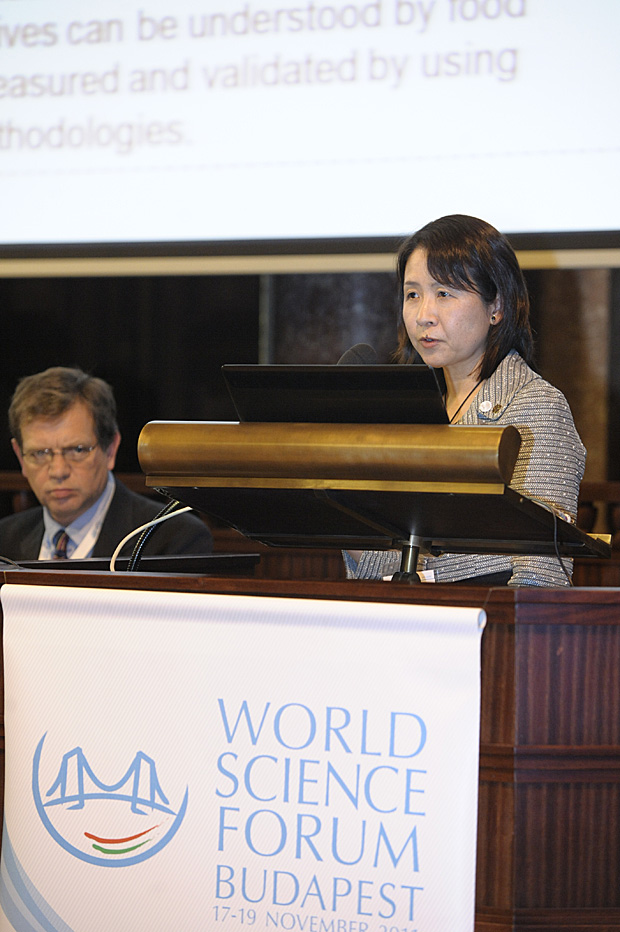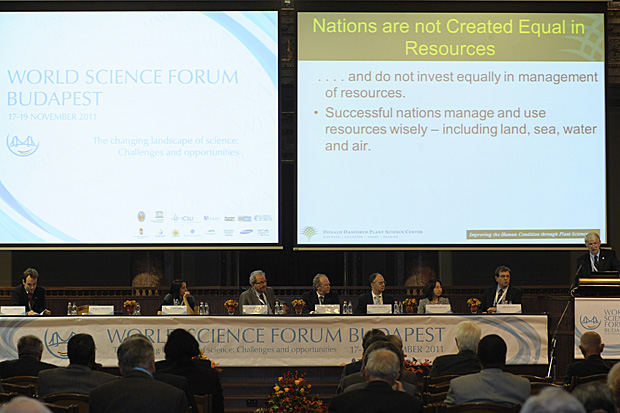代表派遣会議出席報告
1)名 称 (和文)世界科学会議2011
(英文)World Science Forum 2011
2)会 期 2011年11月17日~19日(3日間)
3)会議出席者名 春日文子副会長(17日(夕刻:Reception)及び18-19の2日間出席)
4)会議開催地 ブダペスト(ハンガリー)
Hungarian Academy of Sciences 及び Hungarian Parliament
5)参加状況(参加国数、参加者数、日本人参加者)
約700 名が参加。日本からは学術会議関係者の他、JST 関係者1名、STSフォーラム関係者1名、および国際学術団体関係者が参加。
6)会議内容
今回の会議はHAS(ハンガリー科学アカデミー)主催、UNESCO(国連教育科学文化機関)、ICSU(国際科学会議)、AAAS(アメリカ科学振興会)、EASAC(ヨーロッパ科学アカデミー協議会)、TWAS(第3 世界科学アカデミー)の共催で開催された。
科学者、行政官、民間組織等が参加対象となっている。今後の課題と行動計画を検討することが会議の目的である。
会議は“The Changing Landscape of Science: Challenges and Opportunities”をテーマに11月17日(木)~18日(金)はハンガリー科学アカデミー、19日(土)はハンガリー議会で開催され、全体会議(Plenary Session)といくつか併行して行われるテーマ別会議(Thematic Session)が進められた。
会議における審議内容
2011年11月17日(土)Reception(Tarlosブダペスト市長主催)
・HAS関係者に加え、Lee ICSU会長や、ドイツ・レオポルディナ含め日本学術会議とつながりの深い組織の代表者、並びにSumayaヨルダン王女(President of the El Hassan Science City and the Royal Scientific Societyとして本会合に参加)等と科学・技術の振興についての意見交換を行った。
・Palinkas HAS 会長より、今回の大会宣言案へのコメントについて日本学術会議から提出したコメントをほとんど反映させた原案を作成したとのご意見をいただいた。
2011 年11 月18 日(金)
9:00- 11:00 全体会議(Room A)
・The changing landscape of science: policy implications and drivers と題して、6件の発表があった。
11:30-13:30テーマ別会議(パラレルセッション)
・(Room H) HAS: Networksは6件の発表があった。
・(Room A) AAAS : Developing a coherent and compatible science enterpriseは7件の発表があった。日本からは(独)科学技術振興機構社会技術研究開発センター長有本建男氏が「Reshaping the scientific enterprise for the changing world」と題する発表を行った。
・(Room D) YOUTH-WAYS: Scientific collaboration in the changing landscape of science: new generation of science and researchers は7 件の発表があった。
14:30-16:30 全体会議(Room A)
・FORUM OF GLOBAL FOR A: Sharing Knowledge for Global Challengesと題して7件の発表があった。日本からはNPO法人STSフォーラム専務理事谷口富裕氏が「Lights and Shadows of Science and Technology; Eighth Annual Meeting of Science and Technology in Society (STS forum)」と題する発表を行った。
17:00-19:00 テーマ別会議 (パラレルセッション)
・(Room H) ICSU: Long term perspective on international science Foresight Scenarios: What will international science be like in 2031は7件の発表があった。
・(Room A)Brazil: Sustainable Food Production は7 件の発表があった。日本からは、春日副会長が「Securing Global Food Safety and Fair Trade」と題する発表を行った。
2011 年11 月19 日(金)
9:00- 11:15 全体会議(ハンガリー共和国国会議事堂内)
・Parliamentary session と題して、6 件の発表があった(Navracsics ハンガリー共和国副首相のスピーチ含む)。
11:15-11:30 宣言採択
・Palinkas HAS 会長、Kalonji ユネスコ自然科学局副局長、及び Lee ICSU会長からのプレゼンがあり、原案については幾つかの修正を経ながらも、WSFとして初の宣言公表で全会一致となった。公開済みの宣言全文を「参考」として添付。
12:00-13:00 閉会式
・全体会議としての閉会式では、Schmitt ハンガリー共和国大統領、Bogyayユネスコ会長及びSumayaヨルダン王女、Mercadanteブラジル科学技術担当大臣等要人の講演があった。
次回開催予定
次回のWSFは、ブラジル科学アカデミー主催となり2013 年に開催される。(WSFとしては初めての、開催国持ち回り方式の導入となる。ステアリングコミッティーは、ブラジル科学アカデミーのリーダーシップの下、新たに結成される予定)。
【参考】WSF ホームページからのコピー(※外部サイトへリンク)
DECLARATION OF THE BUDAPEST WORLD SCIENCE FORUM 2011 ON A NEW ERA OF GLOBAL SCIENCE
Text adopted by the 5th Budapest World Science Forum on 19 November 2011 (definitive version)
Preamble
With the encouragement and support of our partner organisations, the United Nations Educational, Scientific and Cultural Organization (UNESCO), the International Council for Science (ICSU) and all invited organisations and fellow scientists, we, the participants of the Budapest World Science Forum held from 17 to 19 November in Budapest, recognizing the relevance of the outcomes of 1999 World Conference on Science (WCS) and taking into account the reports of the biannual World Science Forum (WSF), as well as the debates and the outcomes of this World Science Forum on the “Changing Landscape of Science: Challenges and Opportunities”, adopt the present declaration.
1.The treasure of scientific knowledge and its underlying research approaches are a common heritage of humankind. More than ever before, the world will be shaped by science.
2. The first decade of the third millennium has witnessed steady and fundamental changes in the global landscape of science. The scale and scope of these transformations are so robust that a new milestone in the history of science has been reached, and a new era of global science has commenced. This new era presents challenges and opportunities bringing political, social and policy implications on a previously unseen scale.
3. The growing complexity of grand challenges including population growth, climate change, food supply, energy shortages, natural and technological catastrophes, epidemics, and sustainability require that the world’s scientific establishments assume new roles.
4. New scientific fields have appeared and continue to carve out their niches in the general field of science.
5. The unforeseen spread of information and communication technologies, the inexpensive and instant access to information resources and databanks, and the fall of communication barriers between countries and communities have accelerated the accumulation and dissemination of knowledge.
6. The former triadic dominance of North America, Europe and Japan in global knowledge production has been seriously challenged, and a new multipolar world of science has emerged accompanied by the rise of new scientific powerhouses, which are now not only prominent actors in world economy but have become key players in cutting edge research and development activities.
7. In this new context of global science, science diplomacy is now an acknowledged tool to promote partnership among nations by fostering scientific co-operation.
8. Educational systems have received strong support from their respective governments to the extent that emerging countries currently produce more university graduates and PhDs than the developed world thus rearranging the entire global “knowledge map”. In spite of these new developments the US, EU and Japan are still leaders in scientific performance and continue to invest heavily in research and innovation. The competition is more intense and more open than ever before in the world arena of science.
9. The expansion of scientific networks has also changed the circle of actors participating in research activities. A field once dominated by states and their research networks of national academies, learned societies, and universities is now complemented by a complex network of global companies, international organisations, and individual researchers who are attracted to the best available research infrastructure.
10. The accelerating “knowledge economies” have generated new migration patterns for scientists and increasing mobility. Both the winners and losers of brain drain are facing the need for more intensive co-operation between universities, public research organisations, and industry in both graduate and post-graduate education and the elite training of scientists.
11. The advancements in science have also shed light on new and previously unforeseen concerns. Climate change, the large-scale and irreversible impact of human civilization on the world’s fauna and flora, an overconsumption of natural resources, and their respective consequences require stronger involvement from both scientists and society. Developments in many research fields (e.g. genetics, biotechnology, neuroscience, nuclear physics, etc.) have considerable moral and ethical implications that require an urgent and global dialogue between scientists and the broader public.
In light of this declaration, we make the following recommendations:
1. Responsible and ethical conduct of research and innovation
In this era of global science, the scientific establishment needs to implement continuous self-reflection to appropriately evaluate its responsibilities, duties and rules of conduct in research and innovation. A universal code of conduct addressing the rights, freedoms and responsibilities of scientific researchers, and the universal rules of scientific research should be shared by the world’s scientific community. Furthermore, these rules and policies should be respected by the states and adopted by their national legislations.
Scientists should strengthen their individual and institutional responsibilities to avoid possible harm to society due to ignorance or misjudgement of the consequences of new discoveries and applications of scientific knowledge.
It is the responsibility of those who promote science and scientists to maintain the primacy of moral and social concerns over short-term economic interest in the selection and implementation of industrialised research projects.
2. Improved dialogue with society on scientific issues
In times of rapid and fundamental changes in the social environment, the sciences should be supported in their co-operative efforts to describe and evaluate with the best available methods the consequences of policy actions and explorations of both natural and social sciences.
Participation of societies should be promoted in order to make science more democratic and to build further trust in science.
To this end societies must be prepared to knowledgably discuss the moral and ethical consequences of science and technology by strengthening policies to enhance awareness and public understanding of science and improving and broadening the scope of education.
3. International collaboration in science should be promoted
Better international co-ordination is needed for science research projects focusing on global challenges.
International co-operation is essential for decreasing the knowledge divide and regional disparities.
The free co-operation and movement of scientists should be promoted by the elimination of harmful bureaucracy and false regulation and by providing the funds to further international co-operation.
To avoid repetition, redundancy, and excessive expense in scientific research, the international scientific community should be involved in the development of an improved method to monitor past and present research activities and their results.
4. Collaborative policies to overcome knowledge-divides in the World
The rapid development and increasing cost of science combined with the expansion of patent policies and regulations have further widened the knowledge and economic divide between the developed and developing world.
In a world where the best science and the best researchers are attracted only by excellent research infrastructures, developing countries should be supported in their efforts to build their research capacities.
However, co-funded actions for building capacities can only be successful if support is provided in a socially responsible way and if it creates a win-win situation for both the promoter and the recipient.
Brain-drain and brain-gain policies should be co-ordinated for the joint benefit of all affected countries.
5. Capacity building for science needs to be strengthened
Scientific discoveries are foundations for innovation and social and economic development. Investment in science provides a capacity for future development at a national level and an opportunity to face global challenges internationally.
It is primarily the responsibility of governments to increase support for science, and develop effective policies for technology and innovation.
Comprehensive actions should be taken to strengthen the role of women in science and innovation and to expand the participation of women in science and science policy making.
The socio-economic impacts of science and scientific capacity are well-documented.
National parliaments and governments are urged to declare their commitment to seek scientific advice during the decision making process.
An institutionalisation of such an advisory process is necessary; informed decisions result in great savings.
There is an urgent need to elaborate new, effective science policies at national, regional and global levels to better co-ordinate and monitor scientific research worldwide, to harmonise university education systems, and to facilitate global and regional scientific co-operation based on equity and participation.




